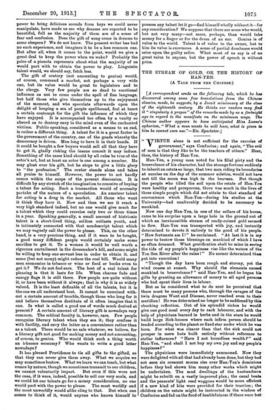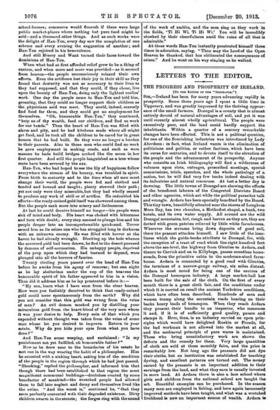THE STREAM OF GOLD, OR THE HISTORY OF HAN-YEN.
(A TALE FROM THE CHINESE.) [A correspondent sends us the following tale, which he has discovered among some free translations from the Chinese classics, made, he suggests, by a Jesuit missionary at the close of the eighteenth century. He thinks our readers may find it " singularly a propos" of the remarks made by us a fortnight ago in regard to the manifesto on the minimum wage. The Chinese author appears to have anticipated Miss Loane's aphorism, " What a man wants he will have, what is given to him he cannot even use."—ED. Spectator.] " VIRTUE alone is not sufficient for the exercise of government," says Confucius ; and again, " The evil of men is that they like to be the teachers of others." Hear, then, the history of Han-Yen.
Han-Yen, a young man noted for his filial piety and the benevolence of his character, had the strange fortune suddenly to inherit an estate so large, that two men riding its boundaries at sunrise on the day of the summer solstice, would not have met till the moon was high in the heavens. But though the people who tilled the soil upon the estate of Han-Yea were healthy and prosperous, there was much in the lives of these simple people which did not attain- to that standard of convenience which Han-Yen—during his studies at the University—had unalterably decided to be necessary to mankind.
Now one day Han-Yen, in one of the cellars of his house, came to his surprise upon a large hole in the ground out of which an inexhaustible stream of ready-coined gold seemed to flow. Han-Yen was transported with joy, and instantly determined to devote it entirely to the good of his people. " How fortunate am I!" he exclaimed. " At last it is in my power to bestow those blessings on mankind of which I have so often dreamed. What gratification shall be mine in seeing the tide of my people's happiness rise like the waters of the Yen Sen River after the rains ! " No sooner determined than put into execution!
" Though the day have been rough and stormy, yet the wind ceases at sunset. Why should the elements exceed mankind in benevolence ? " said Han-Yen, and he began his gifts by granting an allowance of money to all aged persons who had spent their lives in labour.
But as he considered what to do next he perceived that there must be many persons who, through the ravages of the twin dragons Want and Disease, never reached even to their meridian ! He was determined no longer to be saddened by this shocking reflection. Out of his splendid riches he would give one good meal every day to each labourer, and with the help of physicians learned in herbs and in the stars he would build large Sick-houses where each infirm person should be tended according to the planet or fixed star under which he was born. For what was clearer than that the sick could not prosper in mere huts built entirely without reference to stellar influences ? " Have I not boundless wealth P" said Han-Yen, "and shall I not buy my own joy and my people's happiness P" The physicians were immediately summoned. Now they were delighted with all that had already been done, but they had not seen six crescent moons rise over Han-Yen's dominions before they had shown him many other works which might be undertaken. The mud dwellings of the hasbandmen might be rebuilt on a vastly improved plan ; the canal boats and the peasants' light reed waggons would be more efficient if a new kind of kite were provided for their traction ; the children on the estate might be instructed in the wisdom of Confucius and fed on the food of healthfulness if there were but school-houses; commerce would flourish if there were large public market-places where nothing but pure food might be sold—and a thousand other things. And as such works were the delight of Han-Yen, every day saw the completion of one scheme and every evening the suggestion of another; and Han-Yen rejoiced in his benevolence.
And gill Misery and Want turned their faces toward the dominions of Han-Yen.
When what had at first afforded relief grew to be a thing of custom, and when more and more was provided—as it seemed from heaven—the people unconsciously relaxed their own efforts. Even the artificers lost their joy in their skill as they found that dexterity was not as necessary to their lives as they had supposed, and that they could, if they chose, live upon the bounty of Han-Yen, doing only the lightest coolies' work. One day the people came to Han-Yen and told him, groaning, that they could no longer support their children as the physicians said was meet. They could, indeed, scarcely find food for them, and they could get no employment for themselves. "Oh, honourable Ban-Yen," they continued, "help us of thy wealth, feed our children, and find us work for our hands." Then the heart of Han-Yen was filled with alarm and pity, and he had kitchens made where all might get food, and he took all the children to be cared for in great houses that he had built. So they were no longer a burden to their parents. Also to those men who could find no work be gave employment in making roads, and such as were masons he bade build bridges arched like the moon in her first quarter. And still the people languished as a tree whose roots have been severed by the axe.
Han-Yen, who had hoped to see the lily of happiness follow everywhere the stream of his bounty, was troubled in spirit. From birth to maturity and to the time when all men must change their world, the people were fed and clothed and tended and housed and taught; plenty strewed their path ; yet not only were they miserable, but they had wholly ceased to produce any work of skill or of artifice. He redoubled his efforts—the ready-coined gold itself was showered among them. But the people sank more into misery and listlessness.
At last he could deceive himself no longer—his people were sick of mind and body. His heart was choked with bitterness and torn with doubt ; every step seemed to plunge him and his people deeper into an incomprehensible quicksand. Terror seized him as its seizes one who has struggled long in darkness with an unknown enemy. He was filled with horror at the havoc he had already wrought. Blocking up the hole whence the accursed gold had been drawn, he fled to the desert pursued by demons of self-accusation. His unhappy people, deprived of the prop upon which they bad learned to depend, were plunged into all the horrors of famine.
Twenty circling years passed over the bead of Han-Yen before he awoke from his agony of remorse; but one night as he lay shelterless under the cup of the heavens the honourable spirit of his father appeared to him in a vision. Thus did it address him as he lay prostrated before it:-
" My son, learn what I have seen from the clear heaven. How were you foolishly deceived to think that ready-coined gold could issue spontaneously from the earth P Why did you not consider that this gold was wrung from the veins of men ? An evil demon mocked you by distilling your miraculous gold from the heart-blood of the very men whom it was your desire to help. Every coin of that which you expended without thought was taken from the veins of some man whose lot you desired to improve. Return to your estate. Why do you hide your eyes from what you have done ? "
And Han-Yen arose weeping, and exclaimed : " Is my punishment not yet fulfilled, oh honourable father P"
Now as he drew near to the boundaries of his estate he met one in the way wearing the habit of a philosopher. Him he accosted with a sinking heart. asking him of the condition of the people in the region through which he had just passed. "Shocking," replied the philosopher, and informed him that though there had been established in that region the most magnificent communal buildings—doubtless erected by some benefactor of mankind—the wretched people had allowed them to fall into neglect and decay and themselves lived like the swine. " And the worst is," continued he, " that they seem perfectly contented with their degraded existence. Dirty children swarm in the streets; the forges ring with the sound of the work of smiths, and the men sing as they work in the fields, Ti Hi Wi, Ti Hi Wi.' You will be incredibly shocked by their cheerfulness amid the ruins of all that is admirable."
At these words Han-Yen instantly prostrated himself three times in adoration, saying, " Then may the Lord of the Open Heaven be thanked, that has obliterated the consequences of crime." And he went on his way singing as he walked.











































 Previous page
Previous page